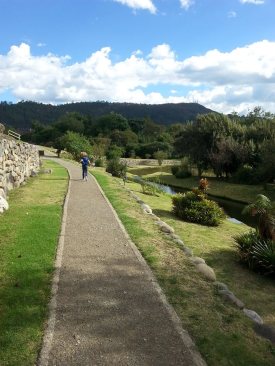School breaks are a wonderful time to take your children abroad where they can learn about different countries, languages, foods, and sites. And homeschooling allows for an even greater flexibility to travel.
My wife, son, and I had the opportunity to live in South America for two years. This was an experience that I feel was fundamental to our child’s view of the world. We have also spent significant time in Mexico. Furthermore, these trips have opened up a variety of writing projects for our son.
view of the world. We have also spent significant time in Mexico. Furthermore, these trips have opened up a variety of writing projects for our son.
However, not knowing the language of a country that you’re visiting is not unusual. Many people love to be in new countries and experience new cultures, and traveling is an invaluable addition to one’s education—but we can’t simply pick up a language in a few weeks or even months. We shouldn’t let these language barriers prevent us from exploring the world around us, though.
So, what should you do when you don’t speak the language of the land? Below are a few tips I came up with while living abroad.
Learn the basics. At least learn how to say hello, please, thank you, excuse me, and goodbye. In Ecuador, for example, you don’t just walk into a store, look around, and leave. You should say “Buenos dias” or “Buenas tardes” (depending on the time of day) when you enter a store. If not, you’re rude. Furthermore, when you leave a small store, it’s important to say, “Gracias,” even if you didn’t buy anything.
As a safety precaution, learn how to say a few distress phrases. Even if you don’t end up needing them, you’ll feel more at ease having words like “help,” “emergency” and “police” in your vocabulary.
I also recommend you learn to ask for bathrooms, food, and drink. These can be important.
Use hand gestures and sounds. Nodding, pointing, and even making movements that represent what you’re saying can be very successful. Of course, gesturing for a bathroom might not be a good idea. So, like I said in number one, learn how to say it.

Bring a notepad. Drawing pictures is a great way to get your point across without having to play Guess-what-I’m-saying-based-on-my-gestures. Also, in Spanish-speaking countries, you could sometimes get away with writing the word in English, first. If you need a hospital, for example, you could communicate by writing the word. When a local sees the word in writing, they’ll know what you need because it’s the same in Spanish. If you say it in English, though, they might not understand you since the pronunciation is different.
Take notes. In that notepad, write down some important words and phrases that you think you might need but haven’t been able to learn. If it’s a short list and you know what’s in it, you’ll be able to find it fast. As a plus, you might learn those important words and phrases just from writing, saying, and repeating them.
Also, in the notepad, you could put the street address where you’re staying. If you get lost or don’t have a ride, you could show a taxi driver the address, with the nearest cross street–even if you don’t know how to pronounce it.
Be patient, stand back and observe. Many questions can be answered without speaking. Before asking, you might see a sign that indicates public bathrooms or a street name that looks familiar.
Use your smartphone. I recommend you use it as you would a pocket dictionary. You can also use a smartphone to translate text in photos, like street signs or menus.
Using a smartphone in some areas might prove to be a bit dangerous, depending on where you’re traveling. In that case, you might consider the old-fashioned method: a paper dictionary.
 Then, there’s the ever-frustrating suggestion: Take classes, meet a local, start a conversation. People traveling and living abroad have heard this over and over again. These are great ways to learn the language. However, for those who have tried this approach, you know it’s easier said than done. You don’t just learn it by being in a new country. Learning a new language is hard work and it’s frustrating. But be strong, have patience, learn the essentials, and enjoy the country you’re in.
Then, there’s the ever-frustrating suggestion: Take classes, meet a local, start a conversation. People traveling and living abroad have heard this over and over again. These are great ways to learn the language. However, for those who have tried this approach, you know it’s easier said than done. You don’t just learn it by being in a new country. Learning a new language is hard work and it’s frustrating. But be strong, have patience, learn the essentials, and enjoy the country you’re in.
If you decide you want to learn a new language, you will be taking on a worthy task. You can read more about the benefits of learning a foreign language in an earlier post: Improve your English Grammar by Learning a Foreign Language.

Great post
LikeLike
Nice post! Really it is good thinking to make more enjoyable to your foreign trip.
LikeLike